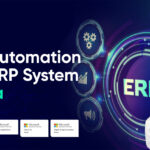Saudi Arabia’s leading ERP software solutions are making waves in the industry as they intensify their efforts on digital transformation. Businesses are adapting to the new reality, which is affecting industries from healthcare to manufacturing. Companies in Saudi Arabia are using Enterprise Resource Planning (ERP) systems to revolutionize whole sectors by improving efficiency and cutting costs.
Accounting, HR, sales, and supply chain management are among the many corporate processes that may be streamlined with the use of these technologies. It is because they enable informed decision-making by bringing together data from all throughout the company and providing real-time insights. Let’s understand how ERP solutions shaping the future of Saudi Arabia’s industries.
What is ERP Software?
Enterprise Resource Planning (ERP) is a software solution designed to integrate and streamline core business processes across various departments within an organization. It serves as a centralized platform to manage critical functions. ERP systems enable businesses to automate processes, improve data visibility and accuracy, enhance decision-making capabilities, and optimize overall operational efficiency. By providing a comprehensive view of business operations in real-time, it empowers organizations to align resources effectively, reduce costs, and drive sustainable growth.
Example:
For instance, when a customer places an order for a specific part, the ERP system automatically generates a production order, schedules the manufacturing process, and allocates resources based on real-time inventory levels. As the production progresses, the ERP system tracks the work-in-progress, monitors machine performance, and alerts supervisors to any deviations from the production plan. Once the part is completed, the ERP system updates inventory levels, generates shipping documents, and notifies the customer of the order status, ensuring timely delivery.
What is Microsoft Dynamics 365 ERP Solution?
Microsoft Dynamics 365 ERP is a cloud-based solution offered by Microsoft. It combines ERP and Customer Relationship Management (CRM) functionalities into a unified platform, providing organizations with a comprehensive suite of business applications. It offers modules tailored to specific business needs, including finance, sales, marketing, supply chain management, human resources, and more. Leveraging advanced analytics, AI-driven insights, and seamless integration with other Microsoft products, Dynamics 365 ERP enables businesses to streamline operations, improve productivity, enhance customer experiences, and accelerate digital transformation initiatives. With its scalable and flexible architecture, it empowers organizations of all sizes to adapt to changing market dynamics, drive innovation, and achieve long-term success.
Example:
For instance, when a customer makes a purchase at any store, the transaction data is instantly recorded in the Dynamics 365 system, providing real-time insights into sales performance and inventory levels. With this information, the retail chain can optimize inventory replenishment, adjust pricing strategies, and forecast demand more accurately. Additionally, Dynamics 365 enables seamless integration between the retail chain’s online and brick-and-mortar stores, allowing customers to browse products, make purchases, and track orders across channels in real-time.
What is the Role of ERP in Serving the Healthcare Industry?
Saudi Arabia’s healthcare industry is embracing industry-leading ERP software—Microsoft Dynamics 365. A top-rated ERP can help you in the following:
- Inventory control and patient management make the systems ideal for constructing complicated procedures.
- ERP software decreases errors, improves patient care, and increases overall efficiency.
- It protects patients’ privacy.
- It provides better business information and more precise cost management.
- ERP eradicates software redundancy and its related expenses through the use of a universal platform that incorporates a central database.
- It supports operational simplification, overall cost reduction, and enhanced decision-making supported by real-time data and insights, which are the outcomes.
What is the Role of ERP in Serving the Saudi Arabia’s Manufacturing Industry?
ERP systems provide a comprehensive solution to streamline various processes, ranging from production planning and inventory management to quality control and supply chain optimization. It assists you in collaborating with different stakeholders within the manufacturing ecosystem, including suppliers, distributors, and customers. Moreover, it allows you to:
- Streamline manufacturing processes for efficiency.
- Facilitate seamless collaboration among stakeholders.
- Empower informed decision-making with real-time data insights.
Role of ERP in Serving the Retail Industry
By integrating various functions such as sales, procurement, and logistics into a centralized system, Dynamics 365 ERP solution provide retailers with a comprehensive view of their operations, enabling them to make data-driven decisions that drive efficiency and profitability. Moreover, ERP systems enable retailers to adapt quickly to changing market demands, ensuring they stay agile and competitive. Moreover, with integrated CRM modules, retailers can gain valuable insights into consumer preferences and behaviors, enabling them to tailor marketing strategies and promotions accordingly.
These solutions facilitate seamless omnichannel retailing, allowing customers to interact with brands across multiple touchpoints seamlessly. Moreover, it allows you to:
- Rationalize inventory management and procurement processes for enhanced efficiency.
- Enable personalized marketing strategies through comprehensive customer insights.
- Accelerate seamless omnichannel retailing to deliver a unified shopping experience.
The Impact of ERP on the Education Industry
These solutions simplify various procedures such as student record management, class scheduling, and financial administration, thereby enabling educational institutions to focus more on delivering quality education. By providing comprehensive modules for attendance tracking, grading, and fee collection, these systems automate repetitive tasks and facilitate smoother operations, ultimately contributing to a more organized and productive learning environment. Centralizing data management and ensuring data security empowers educational institutions to adapt to evolving technological trends while maintaining compliance with regulatory standards. Moreover, it allows you to:
- Simplify administrative tasks such as student record management and class scheduling.
- Ease online learning and interactive discussions, fostering a modernized educational experience.
- Strengthen communication and collaboration among educators, students, and parents, promoting transparency and efficiency in educational processes.
Why Partner with Dynamics Solution and Technology to Implement Dynamics 365 Suite?
Partnering with Dynamics Solution and Technology to implement the Dynamics 365 suite offers a strategic advantage to businesses seeking to streamline their operations and drive growth. With a wealth of expertise in Dynamics 365, we bring a deep understanding of the platform’s capabilities and how they can be tailored to meet the unique needs of each client.
From initial consultation to post-implementation support, we work closely with businesses. So, reach out to us now to access tailored solutions that address your specific challenges and opportunities.






